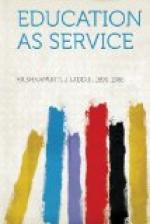Love on the physical plane has many forms. We have the love of husband and wife, parents and children, brothers and sisters, the affection between relatives and friends. But all these are blended and enriched in the love of the Master to His disciple. The Master gives to His pupil the gentleness and protection of a mother, the strength of a father, the understanding of a brother or a sister, the encouragement of a relative or a friend, and He is one with His pupil and His pupil is a part of Him. Besides this, the Master knows His pupil’s past, and His pupil’s future, and guides him through the present from the past into the future. The pupil knows but little beyond the present, and he does not understand that great love which draws its inspiration from the memory of the past and shapes itself to mould the powers of the future. He may even sometimes doubt the wisdom of the love which guides itself according to a pattern which his eyes cannot see.
That which I have said above may seem a very high ideal for the relation between a teacher and pupil down here. Yet the difference between them is less than the difference between a Master and His disciple. The lower relation should be a faint reflection of the higher, and at least the teacher may set the higher before himself as an ideal. Such an ideal will lift all his work into a higher world, and all school life will be made happier and better because the teacher has set it before him.
II. DISCRIMINATION
The next very necessary qualification for the teacher is Discrimination. My Master said that the most important knowledge was “the knowledge of God’s plan for men, for God has a plan, and that plan is evolution.” Each boy has his own place in evolution, and the teacher must try to see what that place is, and how he can best help the boy in that place. This is what the Hindus call Dharma, and it is the teacher’s duty to find out the boy’s dharma and to help him to fulfil it. In other words, the teaching given to the boy should be that which is suitable for him, and the teacher must use discrimination in choosing the teaching, and in his way of giving it. Under these conditions, the boy’s progress would be following out the tendencies made in past lives, and would really be remembering the things he knew before. “The method of evolution,” as a great Master said, “is a constant dipping down into matter under the law of readjustment,” i.e. by reincarnation and karma. Unless the teacher knows these truths, he cannot work with evolution as he should do, and much of his time and of his pupil’s time will be wasted. It is this ignorance which causes such small results to be seen, after many years at school, and which leaves the boy himself so ignorant of the great truths which he needs to guide his conduct in life.




